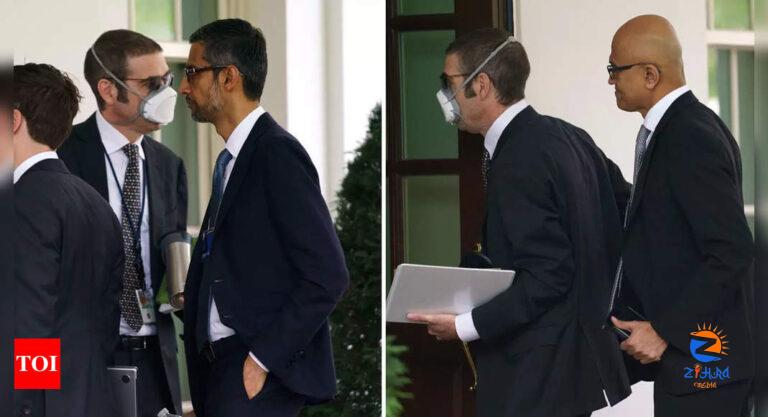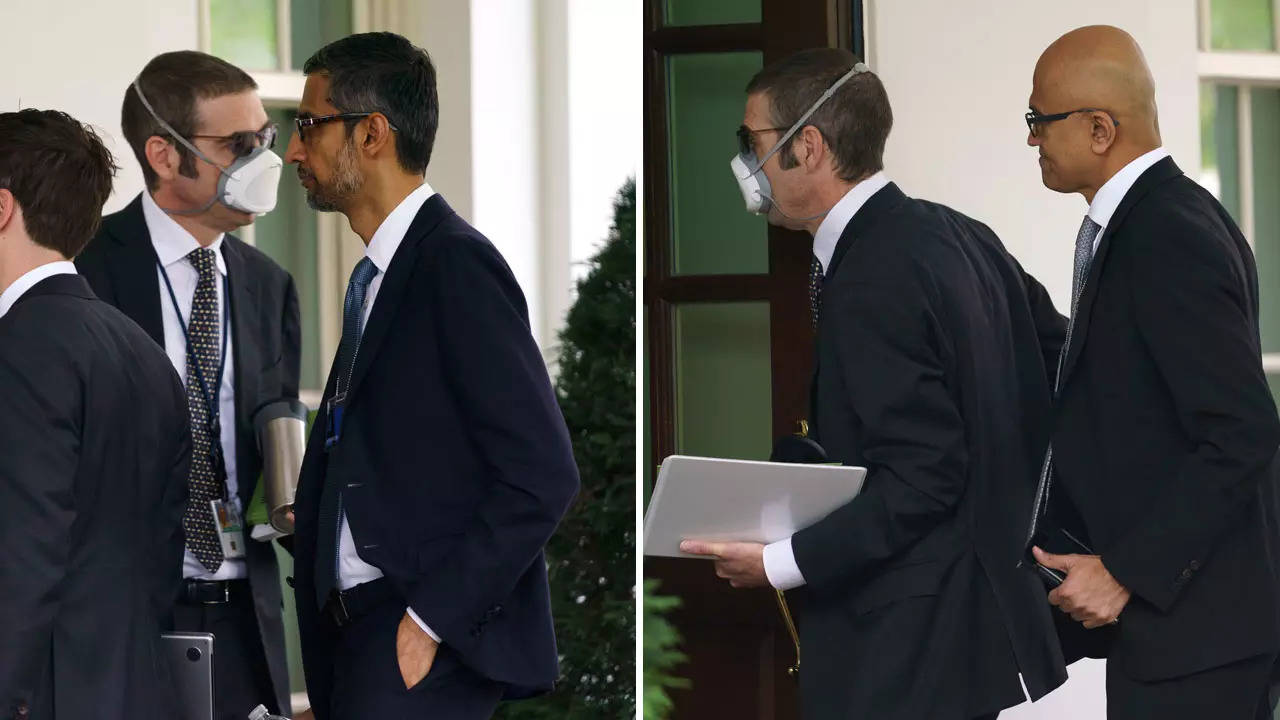
[ad_1]
WASHINGTON: Amid alarming reports about the untrammeled growth and potential subversive power of Artificial Intelligence, the Biden Administration on Thursday summoned top principals in the field, including Google CEO Sundar Pichai and Microsoft CEO Satya Nadella, to the White House in an effort to establish government oversight and regulations in the field.
The emergency White House meeting followed President Biden’s salutary advice that private sector companies have a responsibility to make sure artificial intelligence products are safe before they’re released, even as policymakers and public intellectuals warned of the threats and risks posed by AI, which made global headlines after the overnight success of ChatGPT.
CEOs of leading start-ups OpenAI (Sam Altman) and Anthropic (Dario Amodei), were also called in for the meeting which was presided over by vice-president Kamala Harris, and drew in Biden’s Chief of Staff Jeff Zients, National Security Advisor Jake Sullivan, Secretary of Commerce Gina Raimondo and Director of Science and Technology Policy Arati Prabhakar.
Nadella and Pichai both walked into the White House at around 11 a.m through a gaggle of reporters without offering any comments.
Ahead of the 11.45 a.m meeting, the White House announced a new $ 140 million investment to establish “trustworthy” AI enterprises. Although chump change compared to the billions private companies are pouring into the field – including Microsoft’s $ 10 billion investment in OpenAI — the money will enable the National Science Foundation, which is headed by Chennai-born Sethuraman Panchanathan, to set up seven new National Artificial Intelligence Research Institutes.
“The National AI Research Institutes are a critical component of our Nation’s AI innovation, infrastructure, technology, education, and partnerships ecosystem — driving discoveries that will ensure our country is at the forefront of the global AI revolution,” Panchanathan said in a tweet.
Concerns about the unbridled power of AI — in the face of the benefits and opportunities it is also expected to provide — has been coursing through the administration and Congress for weeks now, leading the White House to seek voluntary commitments from the principals to participate in a public assessment of their AI systems at a cybersecurity conference in August.
The administration has also pledged to release draft guidelines to ensure that the use of AI in government safeguards “the American people’s rights and safety,” while advising private companies to take into consideration the broad set of risks that could affect democratic institutions, Americans’ jobs, and civil rights.
“As new tools hit the market, the extraordinary opportunities that AI presents are coming more into focus. But as is true with all technologies, we know there are some serious risks,” an administration official said at the briefing.
Prominent tech leaders including former Google CEO Eric Schmitt and Tesla-Twitter’s Elon Musk, have expressed concerns about the subversive potential of AI even as they acknowledge the benefits it could bring.
In a factsheet it released ahead of Thursday’s meeting, the WHite House described AI as “one of the most powerful technologies of our time,” but warned that in order to seize the opportunities it presents, “we must first mitigate its risks.”
“President Biden has been clear that when it comes to AI, we must place people and communities at the center by supporting responsible innovation that serves the public good, while protecting our society, security, and economy. Importantly, this means that companies have a fundamental responsibility to make sure their products are safe before they are deployed or made public,” it said.
The emergency White House meeting followed President Biden’s salutary advice that private sector companies have a responsibility to make sure artificial intelligence products are safe before they’re released, even as policymakers and public intellectuals warned of the threats and risks posed by AI, which made global headlines after the overnight success of ChatGPT.
CEOs of leading start-ups OpenAI (Sam Altman) and Anthropic (Dario Amodei), were also called in for the meeting which was presided over by vice-president Kamala Harris, and drew in Biden’s Chief of Staff Jeff Zients, National Security Advisor Jake Sullivan, Secretary of Commerce Gina Raimondo and Director of Science and Technology Policy Arati Prabhakar.
Nadella and Pichai both walked into the White House at around 11 a.m through a gaggle of reporters without offering any comments.
Ahead of the 11.45 a.m meeting, the White House announced a new $ 140 million investment to establish “trustworthy” AI enterprises. Although chump change compared to the billions private companies are pouring into the field – including Microsoft’s $ 10 billion investment in OpenAI — the money will enable the National Science Foundation, which is headed by Chennai-born Sethuraman Panchanathan, to set up seven new National Artificial Intelligence Research Institutes.
“The National AI Research Institutes are a critical component of our Nation’s AI innovation, infrastructure, technology, education, and partnerships ecosystem — driving discoveries that will ensure our country is at the forefront of the global AI revolution,” Panchanathan said in a tweet.
Concerns about the unbridled power of AI — in the face of the benefits and opportunities it is also expected to provide — has been coursing through the administration and Congress for weeks now, leading the White House to seek voluntary commitments from the principals to participate in a public assessment of their AI systems at a cybersecurity conference in August.
The administration has also pledged to release draft guidelines to ensure that the use of AI in government safeguards “the American people’s rights and safety,” while advising private companies to take into consideration the broad set of risks that could affect democratic institutions, Americans’ jobs, and civil rights.
“As new tools hit the market, the extraordinary opportunities that AI presents are coming more into focus. But as is true with all technologies, we know there are some serious risks,” an administration official said at the briefing.
Prominent tech leaders including former Google CEO Eric Schmitt and Tesla-Twitter’s Elon Musk, have expressed concerns about the subversive potential of AI even as they acknowledge the benefits it could bring.
In a factsheet it released ahead of Thursday’s meeting, the WHite House described AI as “one of the most powerful technologies of our time,” but warned that in order to seize the opportunities it presents, “we must first mitigate its risks.”
“President Biden has been clear that when it comes to AI, we must place people and communities at the center by supporting responsible innovation that serves the public good, while protecting our society, security, and economy. Importantly, this means that companies have a fundamental responsibility to make sure their products are safe before they are deployed or made public,” it said.
[ad_2]
